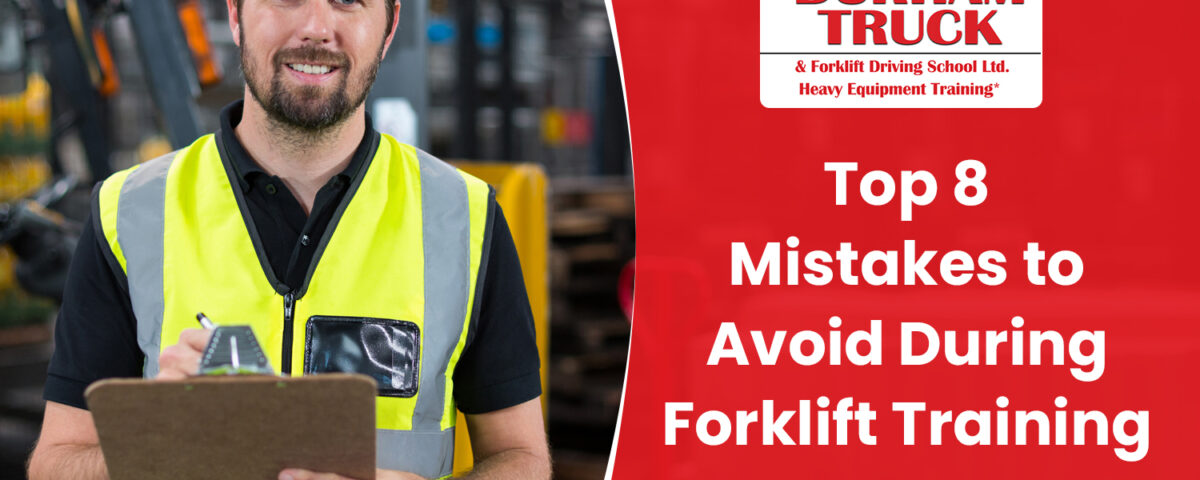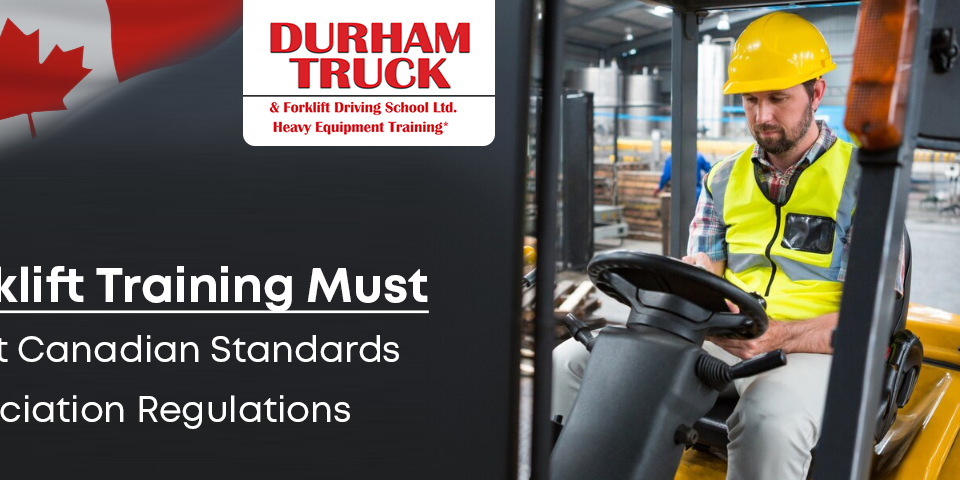Top 8 Mistakes to Avoid During Forklift Training

Safety Tips Every Truck Driver Should Know: How to Stay Safe on the Road
May 18, 2024
How Long Does Truck Driving School Take?
June 17, 2024Introduction:
Welcome to Durham Truck and Forklift Driving School Ltd., where we prioritize safety and efficiency in forklift operation. Forklifts are indispensable tools in various industries, but their operation requires skill, attention to detail, and commitment to safety protocols. Proper training is essential to ensure the safety of operators and those around them.
This comprehensive guide will explore the top 10 mistakes to avoid during forklift training. By understanding these common pitfalls and how to navigate them, you can enhance your skills, minimize risks, and become a proficient forklift operator.
- Lack of Proper Training: One of individuals’ most significant mistakes is attempting to operate a forklift without adequate training. Forklifts are complex machines with specific operational requirements and safety considerations. Operators who lack proper training are more likely to cause accidents, damage property, or injure themselves or others. At Durham Truck and Forklift Driving School Ltd., we emphasize the importance of comprehensive training programs. Our certified instructors provide hands-on instruction covering forklift operation, safety procedures, load handling, and maintenance. Investing in thorough training sets the foundation for safe and efficient forklift operation.
- Failure to Conduct Pre-Operational Checks: Another common mistake is neglecting to perform pre-operational checks before using a forklift. Pre-operational checks are crucial for identifying potential issues or hazards that could compromise the vehicle’s safe operation. This includes inspecting brakes, tires, lights, and steering mechanisms. Our training programs at Durham Truck and Forklift Driving School Ltd. emphasize the importance of thorough pre-operational checks. We teach operators to follow a systematic inspection process to ensure the forklift works appropriately before use. Operators can mitigate the risk of equipment failure and accidents by incorporating this practice into their routine.
- Ignoring Load Capacity Limits: Every forklift has a specified load capacity limit that should never be exceeded. Ignoring these limits is a recipe for disaster, as it can lead to tip-overs, structural damage, or injury. Operators must understand the forklift’s load capacity and ensure that they do not exceed it. We educate operators at Durham Truck and Forklift Driving School Ltd. on load capacity ratings and proper load handling techniques. Our training includes practical exercises demonstrating how to assess loads, distribute weight evenly, and safely secure them. By respecting load capacity limits, operators can prevent accidents and protect themselves and their surroundings.
- Unsafe Driving Practices: Unsafe driving practices are a leading cause of forklift accidents in the workplace. This includes speeding, reckless maneuvering, and failure to yield to pedestrians or other vehicles. Operating a forklift requires attentiveness, caution, and adherence to established traffic patterns and safety guidelines. Our training programs at Durham Truck and Forklift Driving School Ltd. emphasize the importance of safe driving practices. We teach operators to maintain a safe speed, use horn signals to alert others, and always yield the right of way. By instilling a culture of safety awareness, we help operators minimize the risk of collisions and injuries.
- Improper Turning Techniques: Turning a forklift may seem straightforward, but improper technique can lead to accidents or damage to the vehicle and its surroundings. Common mistakes include:
- Turning too sharply.
- Failing to check blind spots.
- You are neglecting to use turn signals.
Proper turning techniques are essential for navigating tight spaces and avoiding collisions. Durham Truck and Forklift Driving School Ltd. incorporates comprehensive training on turning techniques into our curriculum. We teach operators to assess their surroundings, use mirrors effectively, and execute smooth, controlled turns. Mastering these techniques allows operators to maneuver forklifts safely and confidently in various environments.
- Inadequate Load Handling Skills: Efficient load handling is a core aspect of forklift operation, but many operators lack the necessary skills to do it safely and effectively. Mishandling loads can result in dropped or shifted cargo, structural damage, or injury to personnel. Proper training in load-handling techniques is essential for minimizing these risks. We provide hands-on instruction in load-handling skills at Durham Truck and Forklift Driving School Ltd. Our training covers palletizing, stacking, and securing loads using appropriate equipment and techniques. By filing their load-handling skills, operators can improve efficiency and safety in the workplace.
- Neglecting Maintenance: Forklift maintenance is essential for ensuring the safe and reliable operation of the vehicle. Neglecting maintenance tasks such as routine inspections, lubrication, and repairs can result in mechanical failures or breakdowns during operation. Regular maintenance is key to prolonging the lifespan of the forklift and preventing costly repairs. Durham Truck and Forklift Driving School Ltd. emphasizes the importance of proper forklift maintenance in our training programs. We educate operators on the importance of conducting routine inspections, addressing minor issues promptly, and following manufacturer guidelines for maintenance schedules. By prioritizing maintenance, operators can maximize uptime and minimize the risk of unexpected breakdowns.
- Complacency: Complacency is the most dangerous mistake for forklift operators. Over time, experienced operators may become less vigilant or attentive to safety protocols, increasing the risk of accidents or incidents. Maintaining a proactive approach to safety and continuous improvement is essential for preventing complacency. At Durham Truck and Forklift Driving School Ltd., we instill a mindset of constant learning and improvement in our training programs. We emphasize the importance of staying alert, following established procedures and seeking opportunities for further development. By remaining vigilant and proactive, operators can mitigate risks and contribute to a safer work environment.
Conclusion:
Becoming a proficient forklift operator requires more than technical skill—it demands a commitment to safety, attention to detail, and ongoing training. By avoiding the common mistakes outlined in this guide and participating in comprehensive training programs, operators can enhance their skills, minimize risks, and contribute to a safer workplace environment.
At Durham Truck and Forklift Driving School Ltd., we are dedicated to providing high-quality training that equips operators with the knowledge and skills they need to succeed. Whether you’re a novice operator or an experienced professional, our programs are designed to help you.




